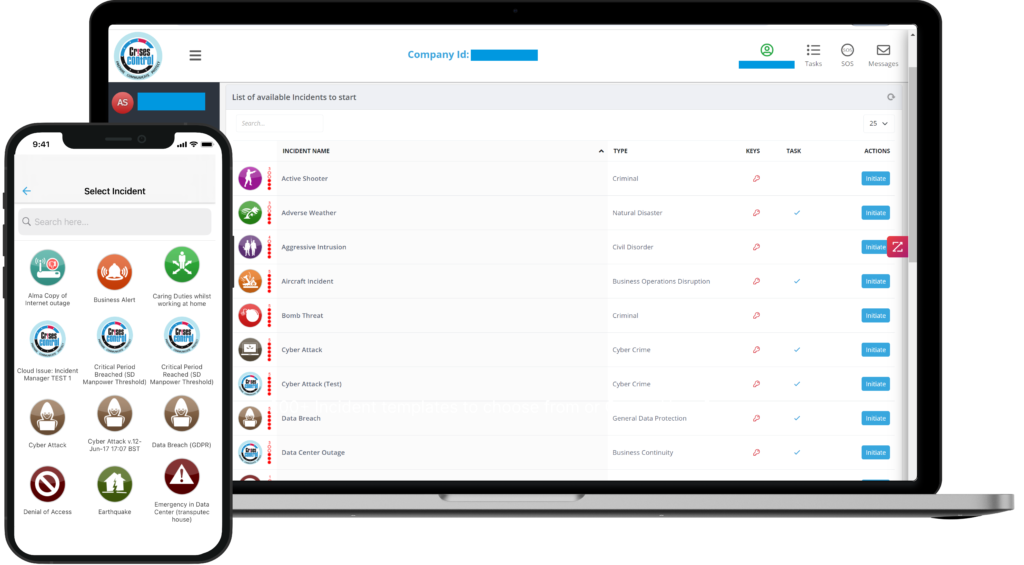Written by Anneri Fourie | Marketing Executive
Supply chain disruptions are no longer rare occurrences; they are the norm. Whether caused by extreme weather, political instability, or infrastructure issues, these disruptions can severely impact businesses. For companies operating in Oman—especially in its capital, Muscat, a key trading hub—the stakes are even higher. The region’s strategic importance in connecting global trade routes makes supply chain resilience not just important, but essential.
But how can businesses in Oman, and beyond, ensure their supply chains remain resilient in the face of such uncertainties? The answer lies in adopting an Incident Management System —a robust, proactive tool that empowers supply chain managers to manage risks effectively and keep operations running smoothly.
In this blog, we’ll explore the growing need for supply chain resilience in Oman, delve into the transformative power of Incident Management Systems, and highlight how Crises Control is helping businesses stay ahead of disruptions.
Why Supply Chain Resilience Is Critical in Oman
Oman’s geographical position makes it a critical player in global trade, linking the East and the West. Major ports like Salalah and Sohar act as essential transit points, making efficient supply chain operations vital to the economy. However, this strategic advantage also comes with its own set of challenges:
- Extreme Weather Events: Cyclones and heatwaves regularly affect transportation and logistics.
- Geopolitical Risks: Oman’s proximity to volatile regions can disrupt trade routes.
- Infrastructure Bottlenecks: Delays in port or road operations can ripple through the entire supply chain.
For businesses that depend on uninterrupted operations, these challenges highlight the importance of advanced tools, such as an Incident Management System, to anticipate and mitigate risks effectively.
What Is an Incident Management System?
An Incident Management System (IMS) is a digital platform designed to manage disruptions with speed and precision. Unlike traditional methods, which often rely on manual intervention, IMS leverages technology to streamline incident resolution.
Here’s how an IMS works:
- Proactive Risk Identification: It monitors real-time data to detect potential disruptions before they escalate.
- Streamlined Communication: IMS enables instant communication between all stakeholders to ensure everyone is on the same page.
- Automated Task Management: It assigns and tracks tasks automatically, reducing delays and errors.
For supply chain managers, an IMS provides an invaluable combination of visibility, control, and agility—ensuring their operations can withstand unexpected challenges.
How an Incident Management System Transforms Supply Chain Risk Management
1. Proactive Risk Mitigation
Supply chain risks are unpredictable, but with an IMS, businesses can take a proactive approach. By monitoring environmental, geopolitical, and operational data, the system flags vulnerabilities early on.
2. Swift Incident Response
Time is critical during disruptions. An IMS facilitates rapid communication and task allocation, enabling teams to respond quickly and effectively.
Scenario:
If a key road in Muscat becomes impassable, the IMS can instantly alert logistics teams, provide alternative routes, and ensure operations continue with minimal downtime.
3. Centralised Communication Hub
Supply chains involve multiple players—manufacturers, transport providers, and distributors. An IMS serves as a centralised platform where all parties can access the same information, reducing miscommunication and delays.
4. Data-Driven Decisions
IMS platforms provide real-time analytics and insights, empowering managers to make informed decisions. Whether it’s reallocating resources or adjusting delivery schedules, these data-driven actions keep the supply chain resilient.
Crises Control: Leading the Way in Oman
At Crises Control, we understand the unique challenges businesses face in Oman’s dynamic environment. Our Incident Management System is tailored to help companies tackle supply chain risks with confidence and efficiency.
Here’s how Crises Control’s IMS stands out:
1. Ping Mass Notification
When seconds count, our Ping Mass Notification system ensures that critical alerts reach the right people instantly. Whether it’s informing drivers of a road closure or alerting warehouse staff about a delay, communication happens in real-time.
2. Real-Time Incident Management
Our platform allows businesses to track, manage, and resolve incidents as they happen. With an intuitive dashboard, you can monitor disruptions, assign tasks, and oversee progress without delays.
3. Task Manager for Streamlined Operations
The Task Manager simplifies complex workflows by automating assignments and tracking completion. This eliminates bottlenecks and ensures timely resolutions.
4. Always-On Cloud Infrastructure
With Crises Control’s cloud-based system, your data remains accessible 24/7, even during local outages. This ensures your supply chain operations remain uninterrupted.
5. Reporting and Audit Features
Learn from every disruption. Our IMS provides detailed reports and audits, enabling businesses to analyse performance and refine their strategies.

Interested in our Incident Management System?
Customise your Incident Management System to meet your specific needs with our flexible tools & stay connected and informed during the crisis and incident management process
Steps to Implement an Incident Management System
1. Assess Current Vulnerabilities
Start by identifying weaknesses in your supply chain, such as communication gaps or outdated processes.
2. Select the Right IMS
Partner with a provider like Crises Control to ensure the system aligns with your operational needs.
3. Train Your Team
Equip your employees with the knowledge to use the IMS effectively, maximising its potential.
4. Continuously Optimise
Regularly review the system’s performance and adapt to emerging risks to ensure ongoing resilience.
Conclusion: Take Control of Your Supply Chain with Crises Control
Supply chain resilience is not just a competitive advantage—it’s a necessity. With an Incident Management System, businesses in Muscat, Oman, and across the world can stay ahead of disruptions, ensuring seamless operations and long-term success.
Ready to transform your supply chain resilience? Contact Crises Control today and experience the power of our Incident Management System with a free personalised demo.
Request a FREE Demo

FAQs
1. What is an Incident Management System, and how does it benefit supply chains?
2. Why is supply chain resilience crucial for businesses in Oman?
3. How does Crises Control’s Incident Management System address Oman-specific challenges?
4. What steps should businesses take to implement an IMS successfully?
1. Assess current vulnerabilities in their supply chain.
2. Choose a system that aligns with their operational needs.
3. Train employees to use the system efficiently.
4. Regularly review and optimise the system to adapt to evolving risks.







